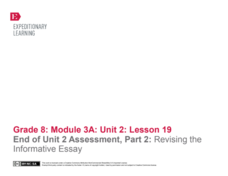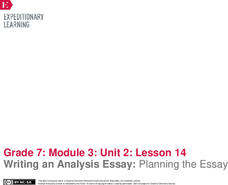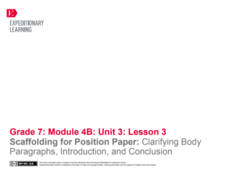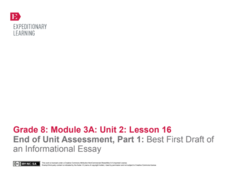EngageNY
End of Unit 2 Assessment, Part 2: Revising the Informative Essay
Is that your final answer? Scholars discuss the terms, edit, and revise. They then complete their final drafts as the end-of-unit assessment of Unbroken. Writers use their graded draft essays from a previous instructional activity to...
EngageNY
Analyzing the Model Essay: Studying Argument
Scholars begin writing an argument essay based on Shakespeare's A Midsummer Night's Dream. They read and analyze a model essay, considering the author's thinking before writing it.
EngageNY
Writing an Argument Essay: Planning the Essay
Pupils use a helpful resource to begin a Writing Improvement Tracker, developing awareness of their writing strengths and challenges. Additionally, they continue planning their argument essays about Shakespeare's A Midsummer Night's...
EngageNY
End of Unit Assessment, Part 2: Revise Essay Drafts
And now for the grand finale! Scholars prepare their final Pygmalion end-of-unit essays. Learners participate in a brief mini lesson plan about correcting errors and then begin revising their own argumentative essays.
EngageNY
Writing an Analysis Essay: Planning the Essay
Writers work on creating a plan for their end-of-unit essay of Narrative of the Life of Frederick Douglass using a Frederick Douglass Essay Planner to help guide their thought process. They then regroup as a class to...
EngageNY
Finishing the End of Unit 3 Assessment: Final Draft of Position Paper and Reflection on the Writing Process
Scholars work on the end of the unit assessment by reflecting on their writing. They answer questions about the process they used to complete their position paper essays. After completing the end of unit assessment, they add images to...
EngageNY
The Painted Essay: Developing a Conclusion and Adding Linking Words
In conclusion ... this essay is the best! Scholars continue working on their painted essays by creating the conclusion. They work in groups to analyze the concluding paragraph in the model painted essay, The Electric Motor. After...
Curated OER
Revising Your Draft
Revising, as opposed to editing, is the focus of a presentation that details this essential part of the writing process. The author of this PowerPoint suggests outlining the draft to determine if all the necessary elements are included...
EngageNY
End of Unit 2 Assessment, Part Two: Final Draft of Analytical Essay
What's one way to make a good essay great? Revise! Scholars revise their drafts from a previous lesson plan to help write their final polished analytical essays about the universal refugee experience. They also practice properly citing...
EngageNY
Writing an Argument Essay: Evaluating the Model and Crafting a Claim
Pupils prepare to write argumentative essays based on Shakespeare's A Midsummer Night's Dream. They begin weighing evidence and crafting claims for their writing about control.
EngageNY
Scaffolding for Essay: Planning Body Paragraphs for Position Paper This work is licensed under a Creative Commons Attribution-NonCom
Scholars begin creating a plan for their position papers using a Sustainable Water Management Position Paper Planner. They talk with partners about their claims and counterclaims for the essays. Writers then work independently to...
EngageNY
End of Unit 2 Assessment, Part 2: Revise Essay Drafts
Positive feedback is a great way to improve writers' skills. Scholars receive their draft essays back with teacher comments and start the revision process. Next, they prepare to begin their final drafts at home.
EngageNY
End of Unit 2 Assessment, Part 1:Drafting the Argument Essay
An informative resource instructs pupils on how to write their essay drafts about the theme of control in Shakespeare's A Midsummer Night's Dream. Next, scholars complete an Exit Ticket, listing their three favorite characters from the...
EngageNY
End of Unit 2 Assessment, Part 2: Revise Essay Drafts
Time to revise! Scholars revise their argument essays based on Shakespeare's A Midsummer Night's Dream using feedback from their teacher and peers. They begin their revisions after reviewing a mini-lesson on proper writing conventions.
EngageNY
Planning the Introductory and Concluding Paragraphs of the End of Unit Assessment Essay
Preparation is the key to success! Using the guiding resource, scholars plan their end-of-unit analytical essays' introductory and concluding paragraphs based on their reading of Inside Out & Back Again. To prepare, they complete a...
EngageNY
Writing and Argument Essay: Peer Critique with Rubric (Chapters 29-31, Including Synthesis of Scenes in Previous Chapters)
Hungry? Try a quote sandwich! Writers discover the concept of using a quote sandwich to introduce and analyze a quote in an argumentative essay properly. Additionally, pupils engage in peer critiques, analyzing each other's drafts and...
EngageNY
End of Unit 1, Assessment, Part 2: Revise Essay Drafts
As a culminating unit activity, pupils revise their argumentative essays based on the novel Lyddie by Katherine Paterson. Paying careful attention to grammar, punctuation, and vocabulary, they incorporate teacher feedback to revise and...
EngageNY
Scaffolding for Position Paper: Clarifying Body Paragraphs, Introduction, and Conclusion
Let's have a talk. Scholars talk through the body paragraphs of their Sustainable Water Management position paper with peers. They take turns explaining their work to one another. They then begin to work independently on the introduction...
EngageNY
The Painted Essay: The Introductory Paragraph
Mimic the model for the perfect essay. Scholars work in groups to analyze a model painted essay The Electric Motor. They compare the structure of the model essay to the painted essay template they created in the previous activity. The...
EngageNY
End of Unit Assessment, Part 1: Best First Draft of an Informational Essay
This is just the beginning. Learners take the first step toward their end-of-unit assessments of Unbroken. They use their tools and knowledge gained from the unit to create first drafts of their informational essays. Writers then respond...
EngageNY
End of Unit 2 Assessment, Part 1: Drafting the Essay
Young writers use the class time to complete a draft argumentative essay. In answer to the Pygmalion end-of-unit prompt they discuss the change seen in Eliza's inner identity.
EngageNY
End of Unit Assessment, Part 1, Continued: Revising Vocabulary and Conventions Based on Feedback
Writers align their position papers with the last two rows in the rubric. After looking at the rubric rows for vocabulary and conventions along with feedback on their papers, class members revise their essays. They then look at the...
McGraw Hill
Writing Prompts, Student Rubrics, and Sample Responses
Whether you are teaching mainstream, advanced, or intervention language arts classes, you will find something helpful in a thorough writing packet. It includes prompts, rubrics, responses, helpful hints, graphic organizers, and many...
Scholastic
Persausive Writing
A unit on persuasive writing guides elementary learners through the writing process. The first part examines the elements of persuasive writing, including expressing an opinion, connecting ideas, using supporting facts, and writing...
Other popular searches
- Descriptive Essay Writing
- Argumentative Essay Writing
- Five Paragraph Essay Writing
- 5 Paragraph Essay Writing
- Essay Writing Topics
- Essay Writing Lessons
- Concept Essay Writing
- 5 Essay Writing
- Essay Writing 5 Paragraphs
- Setting in Essay Writing
- Writing an Essay
- Essay Writing Process

























